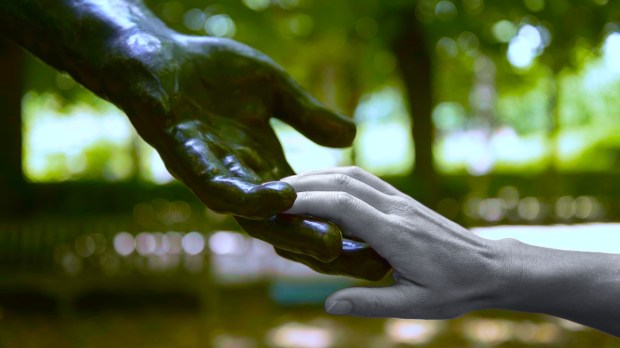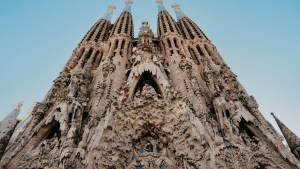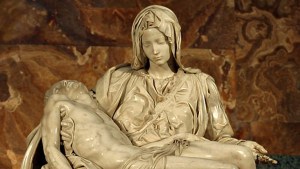At our church on Palm Sunday, the priest gives each individual parishioner a palm leaf at the altar rail. It’s a touching ritual, particularly because the young children get to receive a palm. Under the age of First Communion, there’s not a Sunday that goes by when I don’t hear a complaint from a toddler during the distribution of communion. As a walk away, I hear the toddler loudly bemoan their fate to not receive the Host, complaining to their mother, “Why can’t I have that?” These little ones are eager to participate more fully in the life of the Church, but they must be patient. Not an easy task.
However, on Palm Sunday when young kids go to the altar rail, they also receive the gift. On this day, they aren’t left out. Into those small hands are given palm leaves. In their eyes the look of joy is inexpressible. They proudly take their place in the procession, gripping the treasure tightly.
The expressiveness of our hands
I’ve always loved the way that infants instinctually wrap a hand around the finger of their mother or father. They reach out and grab hold with trust and faith, five small fingers wrapped around a single large one. It’s a simple physical action, the touching of hands, but it creates an unspoken bond. It always created in me a feeling of fatherly protectiveness.
When I was an art student, some of the very first exercises we did were pencil drawings of our own hands. Partly this was out of convenience (we were literally carrying the subject of our pictures around with us), but it was also because the human hand has tons of personality. The shape and contour of the fingers, the weathered lines etched into the palm — there are subtleties in a hand that convey emotion. I don’t know how or why, but hands truly do express the inner life of a person. The great, master artists were always attentive to hands.
Rodin: Master sculptor of hands
The sculptor Auguste Rodin thought of hands as individual portraits every bit as revelatory as faces. In his art studio just outside of Paris, he crafted hand after hand in clay. He would grab any willing model off the street and invite them in for a session. His studio, after a while, filled up with sculptured hands.
His hands are so anatomically accurate that present-day doctors have been able to diagnose some of them as having belonged to the unknown models with specific medical conditions.
Rodin would use all sorts of volunteers as models, and his work is based on a wide range of hands, including those that were racked with weakness and illness. He found value in those imperfect hands, which express the courage of those to whom they belong. The hands were expressive of the meeting of human heroism with physical pain, that unique human quality by which even suffering can be transformed into beauty. Entire stories can be discerned in those suffering hands, ones that are very much worth telling. They are hands that have reached out to receive a gift, and through the art of Rodin, they are returning that gift to the viewer.
The human soul in a hand
Rodin is known as a naturalist sculptor. He molded his clay into images accurate to nature, but this doesn’t mean his work is simply a depiction of exterior surfaces. Through the exterior, as all great art does, his creations reveal interior depths. The soul is every bit as much integral to who we are as our flesh, which is why, in the great masterpieces of art, it seems as though the beauty of the human soul itself luminously glows through what we see painted on the canvas or carved in the stone.
Exploring an interior landscape over decades of honing his craft, Rodin developed an expressive, sensitive technique. His sculptures reveal more than what at first is apparent to the eye. For instance, one of his works depicts the hands of God cradling Adam and Eve, who are still in the process of emerging fully sculpted from unfinished rock. They are literally being born of clay before our eyes. The divine hands are completely sculpted and finished but the figures of Adam and Eve aren’t. It’s an expression of artistic creativity. God’s hands are lovingly bringing a masterpiece into existence. Rodin is a creator, too, and his work is a masterpiece, but the true work of art are flesh-and-blood human beings. The master artist is God. You are his best work.
Rodin and Michelangelo
Similar to Rodin’s sculpture of Adam and Eve is Michelangelo’s famous painting on the ceiling of the Sistine Chapel. The central panel is a fresco of God reaching out a hand to Adam. Their fingers are almost touching but not quite. The space between, that tantalizing separation of man from his Creator, is overflowing with energy. The viewer cannot help but anticipate the next instant, that future moment when the fingers touch and Adam is endowed with a soul.
The artist Caravaggio later pays homage to Michelangelo when he poses the hand of Christ in the exact same way in his painting The Calling of Saint Matthew. The implication is that Matthew, who was a sinner living in darkness, is being called by Christ to become a new creation. With both of these paintings, the interior meaning is all in the hands.
Hands in Christianity
In the life of a Christian, hands are supremely important. We use our hands to bless ourselves with the sign of the cross, receive into them blessed candles on Candlemas, hold infants over the baptismal font in which they are reborn. At the anointing of the sick, hands are anointed with oil. At his ordination, the hands of the priest are chrismated. In the sacrament of confession, forgiveness of sins is accompanied by a sign of the cross from the hand of the priest. We receive so many gifts into our hands.
On Palm Sunday, we receive one more gift, a palm that represents new life and functions as a sign of our place in Paradise. Perhaps your parish has a procession on this day, and as you take your place in the sacred pilgrimage holding your palm, you are feeling your way through a beautiful world. All sorts of hands receive the palms, strong or weak, suffering or joyful, old or young. To each and every one, God bids us open them up and receive his gift.



